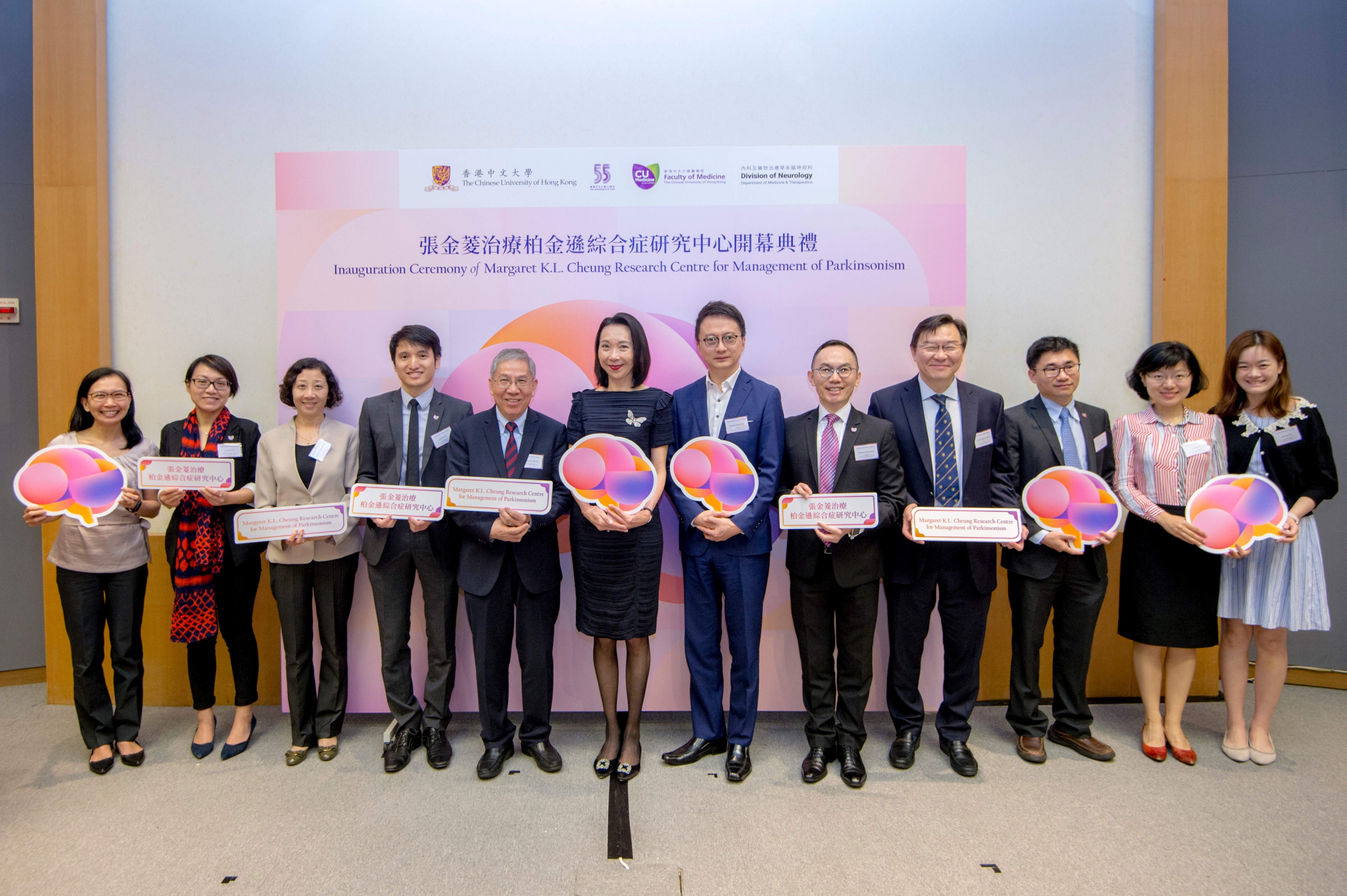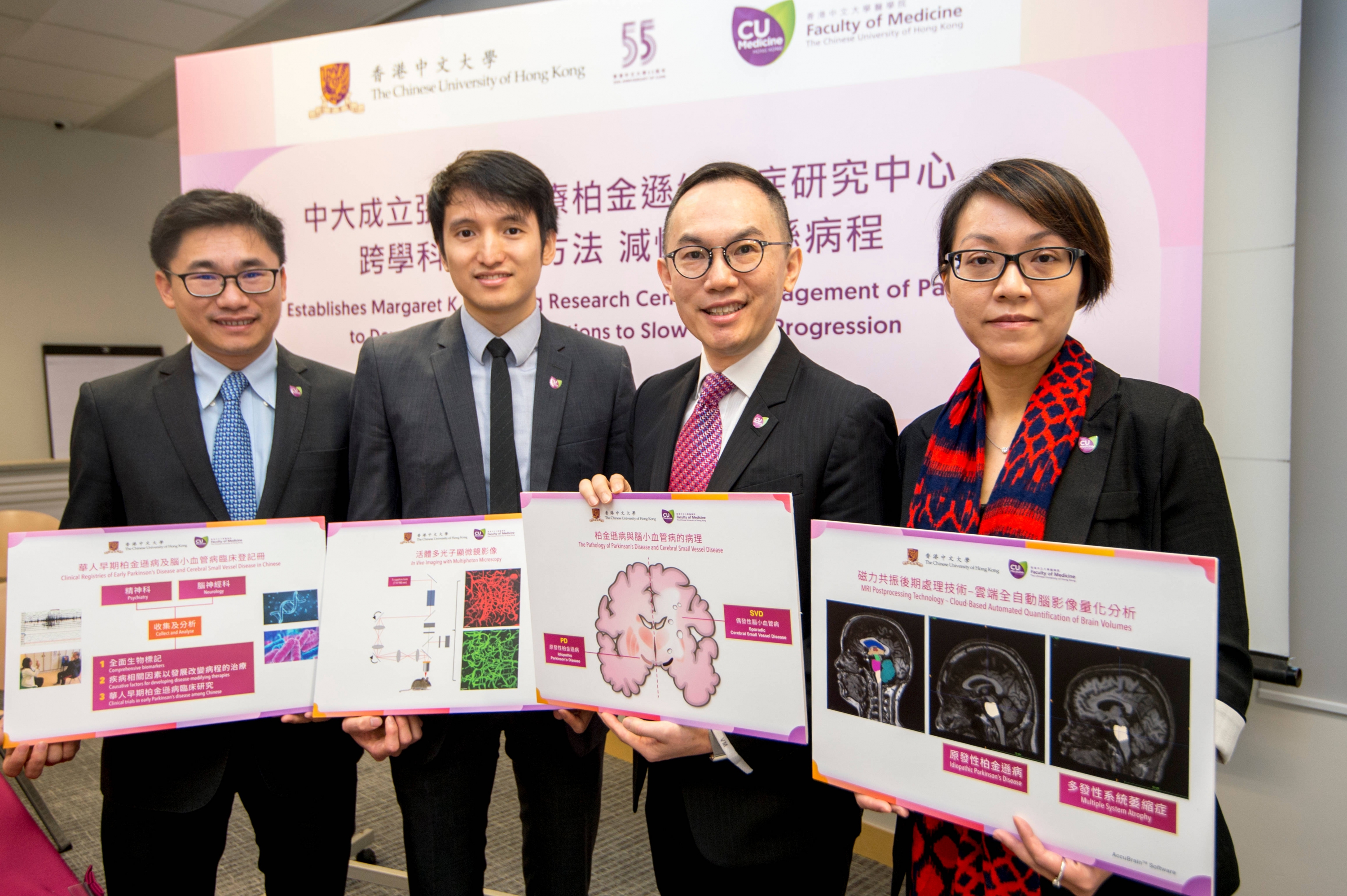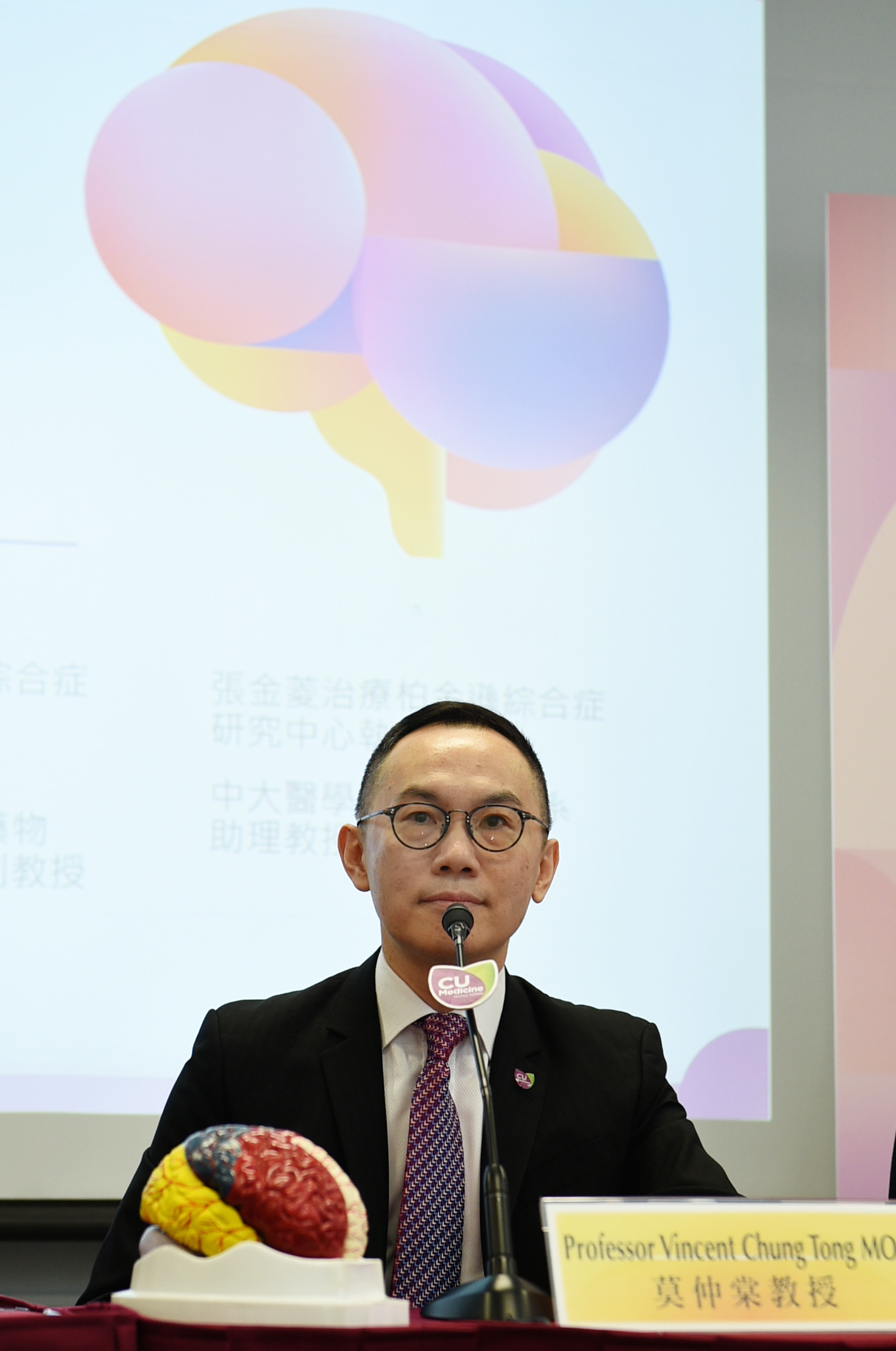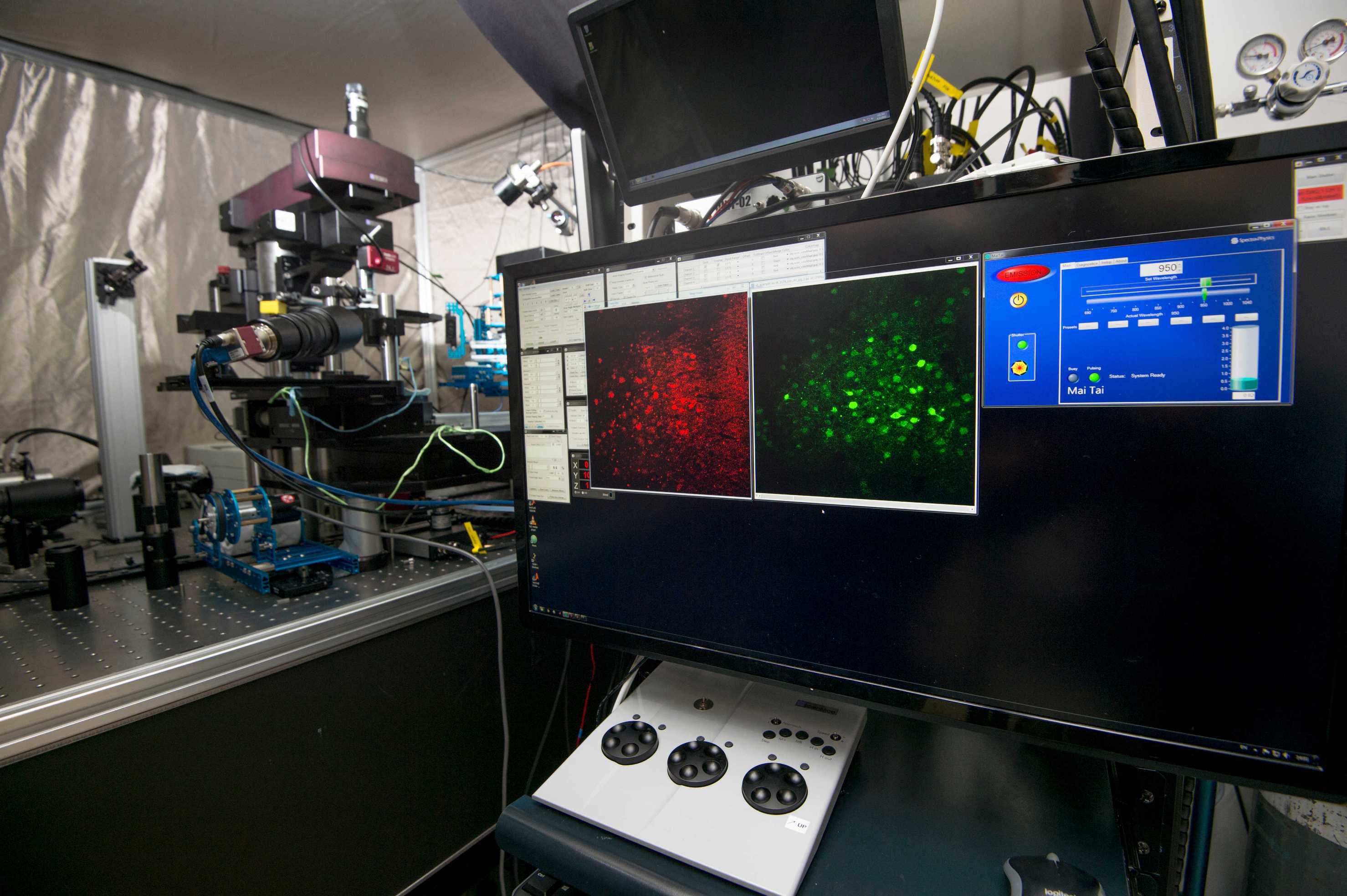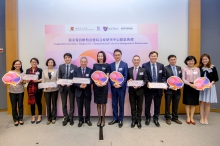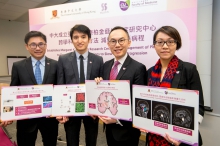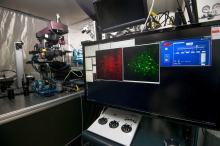CUHK
News Centre
CUHK Establishes Margaret K.L. Cheung Research Centre for Management of Parkinsonism To Develop Innovative Solutions to Slow Disease Progression
The Faculty of Medicine at The Chinese University of Hong Kong (CUHK) inaugurated the Margaret K.L. Cheung Research Centre for Management of Parkinsonism (the Centre) today (11 April), World Parkinson’s Day. With a generous donation from Ms. Margaret Kam Ling CHEUNG, the Centre is set up to conduct transdisciplinary research that enables the discovery of therapeutics for preventing or slowing the progression of parkinsonism.
The Centre will establish registries for early stage Parkinson’s disease (PD) and cerebral small vessel disease (SVD), both the most common diseases causing parkinsonism, in Chinese subjects to develop precise biomarkers and diagnostics as well as to predict and monitor disease progression. The team has also built Hong Kong’s first custom-built in vivo multiphoton microscope which will greatly enhance the future development of novel therapeutics that can delay the progression of SVD.
Over 6 million individuals suffer from PD globally, while one third of HK elderly are harbouring SVD
Parkinsonism was first identified more than 200 years ago (1817) by Dr James Parkinson. It refers to a cluster of symptoms that primarily includes slow movement, together with other conditions such as stiffness, tremor and/or instability. The most common diseases causing parkinsonism include idiopathic PD, which is the second most common neurodegenerative disease, and sporadic cerebral SVD. Currently, it is estimated that 6.1 million individuals suffer from PD globally. In China there are 1.7 million and in Hong Kong 12,000 people with PD. It is projected that the number suffering from PD will at least double in the coming two decades because of an ageing society. As for SVD, the prevalence is even higher. About one third of the elderly in Hong Kong are incubating this disease, contributing to a slow and unsteady gait that is commonly seen in many older people. Stroke and dementia are other common manifestations of SVD.
Donor Ms. Margaret Kam Ling CHEUNG, said at the inauguration ceremony of the Centre, “Thousands of individuals and their families are being affected by parkinsonism in Hong Kong and around the world. I hope the Centre can advance research breakthroughs in the management of parkinsonism to benefit the well-being of patients and families suffering from parkinsonism.”
Professor CHAN Wai Yee, Pro-Vice-Chancellor/Vice-President of CUHK, remarked, “The establishment of this Centre is very timely given the expected increasing burden of parkinsonism coming with the ageing society. We believe this donation will realise the visionary steps taken by CUHK to generate a profound understanding of advancing parkinsonism management, alleviate the suffering of patients and their families and raise up future high quality researchers in this field.”
Experts from different disciplines unite in the fight against parkinsonism
Despite certain breakthroughs made over the centuries in the management of parkinsonism, there is still no effective treatment that can slow progression of PD and SVD. Professor Vincent Chung Tong MOK, Director of the Centre, Mok Hing Yiu Professor of Medicine and Head of the Division of Neurology, Department of Medicine and Therapeutics, Faculty of Medicine at CUHK, stated, “Developing novel disease-modifying therapeutics that can be applied at the earliest stage of the disease is the grand challenge in the fight against parkinsonism.”
To tackle this challenge, the Centre will unite researchers from different disciplines (including clinician scientists, neurologists, psychiatrists, neuroscientists, radiologists and engineers). The team will focus on unravelling disease mechanisms and developing early detection methods and therapeutics that can slow the progression of the diseases.
Hong Kong first’s custom-built multiphoton microscope for SVD pathogenesis
Basic research focusing on SVD is severely lacking in Hong Kong and Asia. The Centre has built a state-of-the-art in vivo multiphoton microscope dedicated to the study of SVD. Dr. Owen Ho KO, Associate Director of the Centre, Assistant Professor and Head of Translational Neuroscience Unit at the Division of Neurology, Department of Medicine and Therapeutics and Assistant Professor of the School of Biomedical Sciences, Faculty of Medicine at CUHK, explained, “Our system allows simultaneous measurements of neuronal and neurovascular changes in awake behaving animals, for studying pathogenic changes in the structure and functions of brain vasculature in animal models of SVD. Combined with single-cell genomic techniques, our work will enhance the fundamental understanding of the pathogenesis underlying SVD, the knowledge of which is crucial for the future development of novel therapeutics that can delay disease progression.” The Centre has also built cellular and animal laboratories for conducting other basic research for PD and SVD.
Setting up an Early PD and SVD registries in Chinese population
Dr. Anne Yin Yan CHAN, Executive Committee Member of the Centre and Clinical Associate Professor (Honorary), Head of Parkinson’s Disease and Movement Disorder Unit, Division of Neurology, Department of Medicine and Therapeutics at CUHK, added, “As well as motor problems, PD is commonly associated with non-motor features such as cognitive and behavioural problems as the disease continues to progress, which further aggravate the disability. Current treatments (including dopaminergic drugs and deep brain stimulation) mainly help improve motor symptoms. Moreover, around 50% to 80% of the dopaminergic nerve cells are lost when the motor symptoms appear. Identifying subjects at an earlier stage and intervening early when degeneration is less severe will offer a higher chance of slowing disease progression as well as preventing the development of disabling symptoms.”
To this end, the Centre will establish registries for early stage PD and SVD in Chinese subjects. These registries will collect data among subjects who are at the early stage, e.g. subjects with REM Sleep Behavioural Disorder (RBD) which is considered as one of the earliest symptoms of PD. Dr. ZHANG Jihui, Executive Committee Member of the Centre and Assistant Professor, Department of Psychiatry, Faculty of Medicine at CUHK, said, “In this collaboration, we aim to develop precise biomarkers and diagnostics, e.g. clinical, whole genome sequencing, microbiota, and neuroimaging, to understand genetic and other putative causative factors, as well as to predict and monitor disease progression at the early stage of PD in the Chinese.” The Centre will also utilise the state-of-art MRI postprocessing technology (AccubrainTM) developed by Dr. SHI Lin, Principal Investigator of the Centre and Assistant Professor, Department of Imaging and Interventional Radiology, Faculty of Medicine at CUHK, to quantify automatically volumetric changes of multiple brain volumes at the early stage of the disease.
With a generous donation from Ms. Margaret Kam Ling CHEUNG (6th from left), the Faculty of Medicine at CUHK sets up the Margaret K.L. Cheung Research Centre for Management of Parkinsonism on the World Parkinson’s Day (11 April). (2nd from right) Dr. SHI Lin, Principal Investigator of the Centre; Dr. ZHANG Jihui, Executive Committee Member of the Centre; Professor WING Yun Kwok, Chairman of the Department of Psychiatry at CUHK Medicine; Professor Vincent MOK, Director of the Centre; Professor Francis CHAN, Dean of CUHK Medicine; Professor CHAN Wai Yee, Pro-Vice-Chancellor/Vice-President of CUHK; Dr. Owen KO, Associate Director of the Centre; and (2nd from left) Dr. Anne CHAN, Executive Committee Member of the Centre.
The Faculty of Medicine at CUHK established the Margaret K.L. Cheung Research Centre for Management of Parkinsonism (the Centre) to conduct transdisciplinary research that enables the discovery of therapeutics for preventing or slowing the progression of parkinsonism. (From left) Dr. ZHANG Jihui, Executive Committee Member of the Centre; Dr. Owen KO, Associate Director of the Centre; Professor Vincent MOK, Director of the Centre; and Dr. Anne CHAN, Executive Committee Member of the Centre.
Professor Vincent MOK states that developing novel disease-modifying therapeutics that can be applied at the earliest stage of the disease is the greatest challenge in the fight against parkinsonism.
The Faculty has built the Hong Kong’s first in vivo multiphoton microscope dedicated to the study of cerebral small vessel disease. It will enhance the fundamental understanding of the underlying pathogenesis, the knowledge of which is crucial for the future development of novel therapeutics that can delay disease progression.


